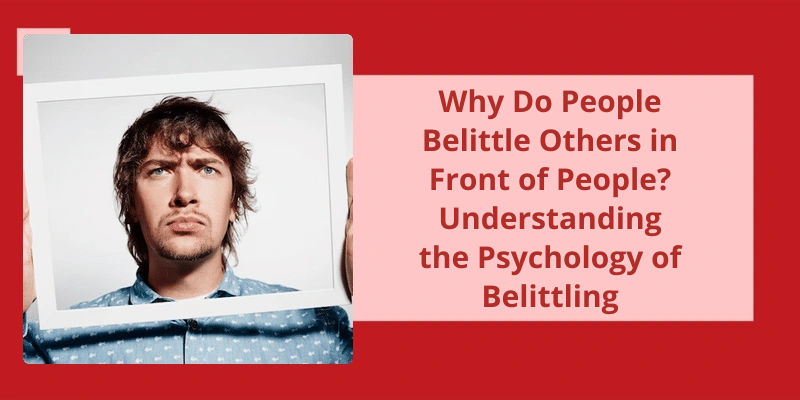Throughout human history, people have been known to exert power and control over others in various ways. One such way is through belittling, where individuals attempt to make others feel inferior and inadequate. However, the reasons behind this behavior aren’t always apparent and can be rooted in underlying psychological issues such as low self-esteem and insecurities. Those who belittle others may do so in an attempt to feel more important or powerful and maintain their position of control in a relationship. While this behavior can be harmful and damaging to the recipient, it’s essential to understand the motivations behind it to effectively address and prevent such behavior in the future.
Why Do People Put You Down in Front of Others?
Perhaps they were raised in an environment where this behavior was normalized, or they’ve previously experienced being put down themselves, and now this behavior has become a part of their own personality. Additionally, some people may use belittling as a way to assert their dominance over others and maintain their power or control in a group dynamic.
Putting someone else down in front of others can also serve as a way to deflect attention away from oneself. Perhaps the person is feeling uncomfortable or inadequate in the given situation and, rather than addressing those feelings, they lash out and try to divert the focus onto someone else.
It’s important to note that putting others down is a harmful behavior that can have negative consequences on the person being targeted. It can lead to feelings of shame, inadequacy, and low self-esteem, all of which can impact a persons mental health and well-being. Additionally, this behavior can damage relationships and create a toxic dynamic within group settings.
If you find yourself on the receiving end of someone elses belittling behavior, it’s important to establish healthy boundaries and communicate your feelings. This could mean calmly and assertively standing up for yourself or choosing to remove yourself from the situation altogether.
Ultimately, it’s important to remember that everyone has their own insecurities and struggles. While it may be tempting to try and lift ourselves up by putting others down, it’s important to recognize the harm that this behavior can cause and work towards building ourselves up in healthier, more positive ways.
The Difference Between Playful Teasing and Hurtful Belittling
- Playful teasing is intended to make someone smile or laugh.
- Hurtful belittling is intended to cause pain or embarrassment.
- Playful teasing is harmless and generally well-received.
- Hurtful belittling can cause emotional distress and damage to relationships.
- Playful teasing is usually brief and lighthearted.
- Hurtful belittling can be prolonged and targeted.
- Playful teasing is often reciprocal and enjoyed by both parties.
- Hurtful belittling is one-sided and can be a form of abuse or bullying.
Understanding the psychology behind why someone would belittle others is important in identifying and dealing with toxic individuals in our lives. It’s important to recognize that belittling behavior often stems from a deeper insecurity and need for validation, rather than any actual flaw or fault of the person being belittled. With this knowledge, we can begin to take steps to protect ourselves from these types of individuals and work towards cultivating healthier relationships built on mutual respect and support.
What Type of Person Belittles Others?
Narcissists often belittle others as a way to boost their own ego and self-importance. They may see themselves as superior to others and use criticism and put-downs to reinforce that belief. In doing so, they’re able to maintain their own feelings of power and control over those around them.
Belittling behavior can also be a way for individuals to assert their dominance and authority over others. This can be particularly true in situations where one person feels threatened by anothers abilities or accomplishments. By belittling others, they attempt to diminish the other persons achievements and make themselves feel superior.
Those with underlying mental health issues, such as anxiety or depression, may also be more prone to belittling behavior. These individuals may struggle with their own feelings of worthlessness and attempt to project those feelings onto others in an effort to feel better about themselves.
Source: Why Narcissists Belittle Others – Dr Kevin Solomons
However, they can have a major impact on the individual’s self-esteem and confidence over time. In this article, we will explore the different ways that individuals may try to belittle others, the effects that this behaviour can have, and what can be done to stop it.
What Does It Mean When Someone Tries to Belittle You?
Belittling someone is never okay and can leave a person feeling unimportant and insignificant. It’s a form of emotional manipulation that can lead to lasting damage. Sometimes, people may belittle others without realizing it, but it’s important to be conscious of our words and actions to avoid causing harm. Everyone deserves respect and dignity, and belittling behaviour strips people of those rights.
When someone belittles another person, it may be a sign of deeper issues. Perhaps the belittling person feels insecure or threatened by the other persons success or qualities. Alternatively, it may be a way to establish control or dominance in a relationship.
If you’re on the receiving end of belittling behaviour, it’s essential to recognize it for what it’s and speak out against it. No one deserves to be treated as less than they are, and it’s important to establish and maintain healthy boundaries in all relationships. By speaking up and standing firm, you can avoid falling victim to manipulation or control and empower yourself to live a fulfilling life.
It’s important to remember that belittling isn’t just words but can also be subtle actions. For example, ignoring someone, rolling ones eyes, or interrupting them can all be forms of belittling behaviour. These actions can make the other person feel invisible or unimportant, leading to feelings of worthlessness.
Belittling behaviour can also be a sign of emotional or psychological abuse. Abuse is never acceptable and can cause long-term psychological harm. If you suspect that you or someone you know may be the victim of abuse, seek help from a trusted friend or a mental health professional. Remember that there’s no excuse for abuse, and you deserve to be treated with kindness and respect.
In summary, belittling behaviour is harmful and can cause lasting damage to an individuals self-esteem and confidence.
How to Recognize and Deal With Belittling in the Workplace
- Pay attention to the behavior of coworkers and superiors
- Take note of any comments or behavior that make you feel belittled or demeaned
- Address the issue calmly and professionally with the person who’s belittling you
- Consider speaking with a supervisor or HR representative if the behavior continues
- Stay confident and assertive in your interactions at work
- Practice self-care and seek support from trusted friends or colleagues
Responding to someone putting you down in front of others can be a difficult situation to navigate. However, there are several strategies that can help you remain calm and confident. By identifying the reason behind their behavior and logically reasoning around it, you can remind yourself of your personal worth and contextualize the situation. It may also be helpful to distance yourself from the person, defuse the situation, and explain your feelings to them calmly. Additionally, practicing stress management techniques can help you maintain your composure in challenging situations.
How to Respond When Someone Puts You Down in Front of Others?
Being put down in front of others can be a humiliating experience, leaving you feeling insulted, degraded, and diminished. It’s essential to handle such situations with a level head and calm demeanor. Reacting impulsively in such situations can lead to further damage to your self-esteem and reputation.
The first step is to try and figure out why the other person is acting this way towards you. Are they insecure? Are they jealous? Are they trying to gain power or control over you? Once you understand their motives, it becomes easier to choose the best response.
The next step is to logically reason around the situation. Ask yourself, does what they say have any truth in it? If it does, then use this feedback to improve yourself. However, if there’s no truth in their statements, then it’s best to not take them personally and avoid reacting emotionally.
It’s important to remember your personal worth. Dont let another persons words define your worth. Instead, reassert your self-worth, reminding yourself of your qualities and strengths and staying true to your core values.
It’s essential to contextualize the situation. Perhaps the other person is having a bad day or is going through a tough time. Avoid using their hurtful words as a lasting impression of the person and choose to let it go after understanding their situation.
If someone continues to put you down, distance yourself from them. Surround yourself with positive people who uplift and encourage you. Dropping negative individuals from your life can sometimes be the healthiest choice, even if it’s tough.
If the person is someone you’ve to interact with, then defuse the situation. Stay calm and don’t escalate the conversation. Keep your tone measured and neutral and try to change the topic to something more positive.
Be open and express your feelings to the other person. Tell them honestly how their words made you feel. However, do this only if the person is willing to listen and have a constructive conversation. Otherwise, it might not be worth confronting them.
Managing stress through deep breathing, meditation, or physical exercise can help in tough situations like this. It allows you to focus and gather your thoughts, providing a clear and rational response instead of irrational reactions.
Tips on How to Respond to Cyberbullying and Hate Speech Online
- Stay calm and don’t retaliate with more hate or cyberbullying.
- Report the hateful or abusive content to the platform or website moderators.
- Block the person who’s cyberbullying or using hate speech against you.
- Reach out to friends, family members, or a trusted adult for support and help.
- Consider seeking professional counseling or therapy to cope with the emotional impact of cyberbullying and hate speech.
- Remember that you aren’t alone and there are resources and people who can help you.
When faced with belittling behavior, it can be challenging to know how to respond without escalating the situation. Responding with humor can be a useful way to defuse tension and redirect the conversation towards a more positive tone. By using humor, you can help the person making the comment realize the absurdity of what they’ve said and potentially shift their perspective. So, next time someone belittles you, consider responding with a witty and lighthearted remark.
How Do You Respond to Someone Who Belittles You?
Belittling behavior can be hurtful and belittling actions can make the recipient feel small and unimportant. However, it can be important to respond to belittling behavior in a way that diffuses the situation. One way to do this is to use humor. When someone belittles you, try to make a joke out of it or exaggerate the comment to make it seem even more ridiculous.
Humor can be a powerful tool in situations where one is being belittled. It can make the other person realize the absurdity of what they’ve said and make them question the validity of their beliefs. It can also help the recipient of the belittling behavior feel better about themselves and the situation they’re in.
However, it’s important to be careful when using humor and not to overdo it. If the recipient comes across as too aggressive, it could backfire and make the situation even worse. It’s also important to remember that humor may not work in every situation and sometimes it may be necessary to take a more serious approach.
Another option when faced with belittling behavior is to simply ignore it. Ignoring the behavior can show the other person that their words have no effect on you, and may even make them feel foolish for trying to belittle you in the first place.
It’s often rooted in insecurity and fear, and responding with kindness and understanding can help to diffuse the situation and make everyone involved feel better.
The Psychological Effects of Belittling Behavior
- Low self-esteem
- Increase in anxiety
- Depression
- Feelings of helplessness
- Inability to focus
- Difficulty trusting others
- PTSD-like symptoms
- Impaired cognitive function
- Social withdrawal
- Difficulty forming connections with others
Conclusion
In conclusion, belittling others in front of people is a form of behavior that’s motivated by various underlying factors such as low self-esteem, the need for power, and insecurity in relationships. While it may temporarily boost the ego of the person doing the belittling, it ultimately damages relationships and erodes trust. Rather than seeking to elevate themselves at the expense of others, people should strive to build healthy relationships based on mutual respect and support. By recognizing the underlying reasons behind this negative behavior, we can work towards fostering a more empathetic and compassionate approach towards others, thus creating a more positive and inclusive society.






